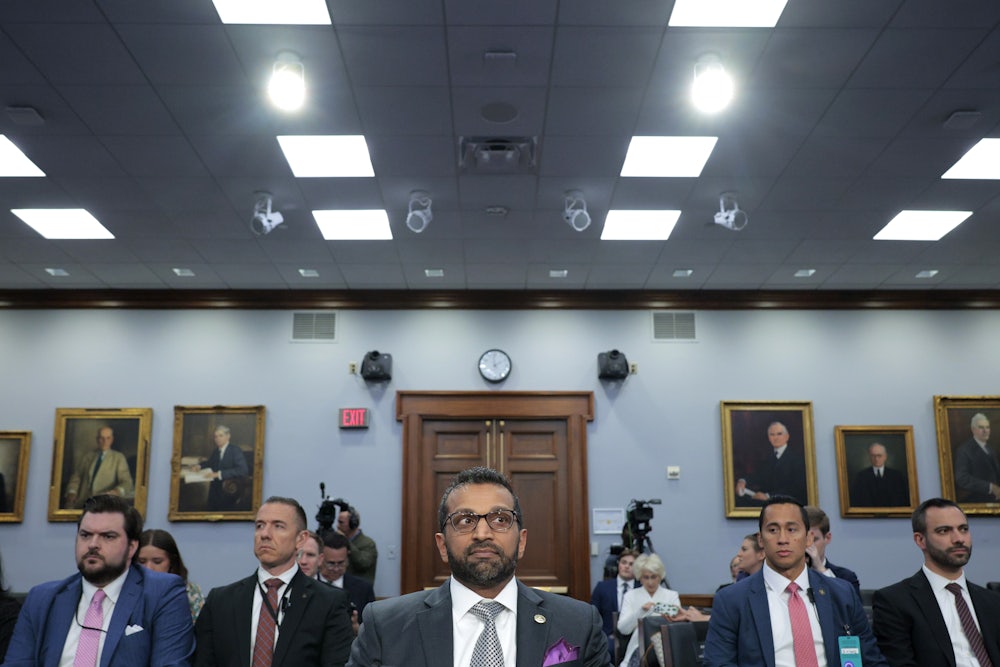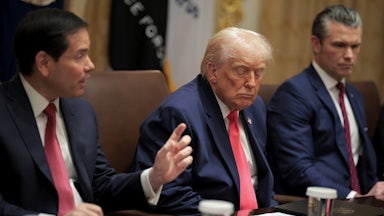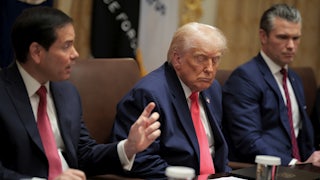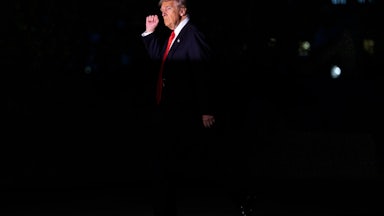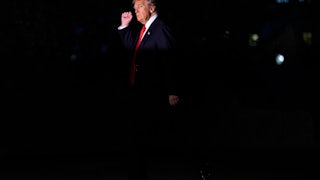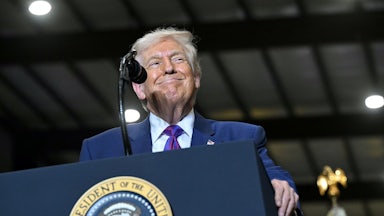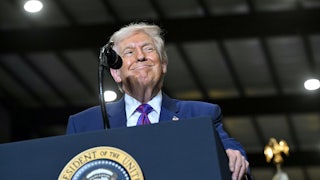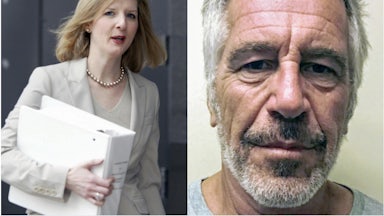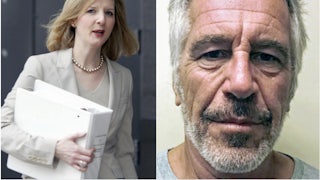Last month, Washington Capitals captain Alex Ovechkin scored his 875th goal in the National Hockey League, surpassing Wayne Gretzky’s long-standing record. Gretzky himself was present for the away game against the New York Islanders. When the cameras cut to Gretzky in the stands, a slightly less familiar face was seated with him: FBI Director Kash Patel.
FBI directors since J. Edgar Hoover have typically been staid, anodyne figures with a low public profile. (James Comey, the showboat leader of the bureau who helped elect Donald Trump in 2016, was a notable exception.) Patel is anything but that: The 45-year-old director has spent his time jetting around the country to sporting events, social events, and Mar-a-Lago.
That jet-setting lifestyle has drawn some scrutiny on Capitol Hill. Senate Democrats have reportedly asked the Government Accounting Office, a federal watchdog agency, to probe Patel’s use of official aircraft for personal business. While FBI directors are generally required to use government airplanes for national security reasons, Patel’s trips often appear to go well beyond what is required for him to do his job.
It is hard to fault Senate Democrats for taking a close look at anything the Trump administration does. Nor can they be blamed for their skepticism of Patel himself. But in this particular case, those who fear that Trump is moving the country in a more autocratic and dictatorial way might want to tread a little more lightly. So far, it seems like Trump’s choice for FBI director is less interested in settling scores and more interested in having fun. What would be a vice in any other administration may be a virtue in this one.
Patel was always an unconventional choice to serve as the head of the top federal law enforcement agency. Past FBI directors included former federal judges, U.S. attorneys, and high-ranking Justice Department officials. Patel, by comparison, only served as a low-ranking line prosecutor in the Justice Department for a few years in the early 2010s.
Patel’s rise instead owed itself to the favor he had garnered with President Donald Trump. He first became a public figure as a House Intelligence Committee aide during Trump’s first term who authored a memo claiming that the FBI’s Russia investigation was illegitimate. He then served as a top national security official in the first Trump administration’s waning days.
His unstinting personal loyalty led Trump to name him as the FBI’s next director, effectively muzzling an agency that had investigated him multiple times over the last eight years. Despite Patel’s lack of experience, Trump described him as a “brilliant lawyer, investigator, and ‘America First’ fighter who has spent his career exposing corruption, defending justice, and protecting the American people,” when announcing the pick.
A more sanguine interpretation is that Trump wanted to bring the FBI to heel, either as a purely defensive strategy or to unleash against his political enemies. In that worldview, Patel is eminently qualified. He wrote a book in 2023 titled Government Gangsters, in which he denounced perceived FBI misdeeds and, in an appendix titled “Members of the Executive Branch Deep State,” laid out an enemies list of roughly 60 names.
That conspiratorial mindset led senators to question whether Patel was an appropriate choice to lead such an important agency. Patel said under oath during his confirmation hearing that their worries were misplaced. “I have no interest, no desire and will not, if confirmed, go backwards,” Patel told the Senate Judiciary Committee. “There will be no politicization at the FBI. There will be no retributive actions taken by any FBI [agents], should I be confirmed as the FBI director.”
That hasn’t quite turned out to be true. Since taking over the bureau in February, Patel has suspended an FBI analyst who worked on two Trump-related investigations that the new director had questioned and reassigned two agents who took a knee during racial justice protests in 2020. He has also sought to restructure the FBI in general by proposing transfers of many of its D.C. agents to the bureau’s branch offices and regional headquarters. While such transfers may be a subtle way to reduce the agency’s overall head count, they also reflect a decentralization of the FBI that Patel seems to favor.
At the same time, there are also signs that Patel is more interested in recreation than retribution. For one thing, he reportedly declined to move to the D.C. area full-time and instead largely works from home at his Las Vegas residence, which is reportedly owned by a GOP megadonor. That decision puts him in sharp contrast with the rest of the federal workforce, which has been ordered by the Trump administration to return to physical offices as quickly as possible after the post-pandemic shift. Unlike most federal workers, it also brings significant logistical challenges since FBI directors routinely work with sensitive and classified material.
Patel has taken part in press conferences and public announcements of major law enforcement developments since his confirmation. But he has also shown a flair for jet-setting. After the Gretzky appearance, The New York Times reported that Patel flew on Air Force One to Miami to attend a mixed-martial-arts competition there. Patel, like Trump himself, is a fan of the Ultimate Fighting Championship league, having attended multiple matches already as FBI director. He has even sought to incorporate it into the training regimen for prospective FBI agents.
CBS News reported recently that Patel’s government-funded travels have taken him not only back and forth from Vegas to D.C., in what might be the nation’s longest commute, but also on multiple jaunts to Nashville, Tennessee, where his girlfriend reportedly resides. Those Nashville trips have included official business, as well—Patel visited the local FBI field office, for example—but also stretch the bounds of what is considered an acceptable use of official resources for a public employee.
To which I say: whatever. In the realm of alleged misconduct by Trump administration officials, using Justice Department jets to see one’s girlfriend may be the least malign. It would not even rank among the top-five scandals involving Trump officials and airplanes over the last three months. This is not to excuse Patel’s actions, of course, but rather to contextualize them.
If anything, Trump’s critics and political opponents should be heartened by Patel’s on-the-job performance so far. Why should those critics want Patel to spend more time doing his job? It is not like he would spend it busting cryptocurrency fraud schemes, chasing down insider trading, or generally tackling white-collar crime. The Trump administration is effectively in favor of those things.
FBI directors have the power to do immense harm if they so decide. J. Edgar Hoover used the agency’s powers to spy on civil rights leaders, routinely violate Americans’ civil liberties, and build dossiers of compromising information about Republican and Democratic politicians alike. Comey, the aforementioned director from 2013 to 2017, may have effectively tipped the 2016 election to Trump by announcing a last-minute investigation of Hillary Clinton less than a fortnight before Election Day.
Fortunately for Americans, Patel seems more interested in having a good time than ensuring Trump’s opponents have a bad time. There are already signs the White House isn’t thrilled with his work ethic: Trump named him as acting director of the Bureau of Alcohol, Tobacco, and Firearms in February, only to strip him of that title and hand it off to Secretary of the Army Dan Driscoll last month. Patel had reportedly never shown up to work there since his initial visit to the ATF headquarters.
Democrats may see that as a sign of weakness and strike accordingly. The more strategic move would be to not draw more attention to Patel’s work habits at the moment. The only thing worse than a Trump-appointed FBI director who isn’t dedicated to his job is one who actually takes Trump’s mandate for the bureau seriously and works zealously to enact it.
